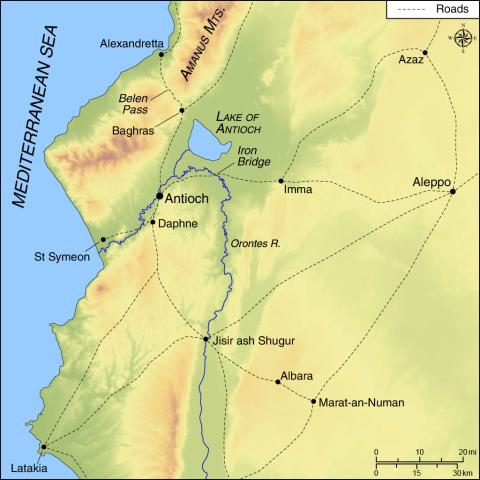Kerbogah Tries to Retake Antioch
[9.22.1] Māter vērō ēiusdem Curbaram, quae erat in Aleph cīvitāte, dēnuō vēnit ad eum, dīxitque illī lacrimābiliter: “Fīlī, suntne vēra quae audiō?” Cui ait ille: “Quae?” Et dīxit illa: “Audīvī quia bellum vīs committere cum Francōrum gente.” Ait ille: “Vērum omnīnō sciās.” Dīxit illa: “Contestor tē, fīlī, per omnium deōrum nōmina, et per tuam magnam bonitātem, nē bellum cum Francīs committās, quoniam tū es mīles invictus, et tē ē campō ab aliquō victōre fugientem quisquam minimē invēnit. Diffāmāta est tua mīlitia ubīque, omnēsque prūdentēs mīlitēs, audītō tuō nōmine, contremīscunt. Satis scīmus, fīlī, quoniam tū es bellipotēns et fortis, nūllaque gēns Chrīstiānōrum vel pāgānōrum ante tuum cōnspectum aliquam virtūtem habēre potuit; sed fugiēbant sōlummodo audītō tuō nōmine, sīcut ovēs ante leōnis furōrem fugiunt. Ideōque obsecrō tē, cārissime fīlī, ut meīs acquiescās cōnsiliīs, et nē umquam in tuō haesītēs animō, aut in tuō inveniātur cōnsiliō, ut bellum velīs incipere cum Chrīstiānōrum gente.”
notes
(June 1098) Kerbogah's mother (according to our author) begs him, despite his victories, not to attack the crusaders.
ēiusdem Curbaram: Cubaram (indeclinable) is again genitive.
in Aleph civitāte: Aleppo. Aleph (indeclinable) is genitive.
Vērum omnīnō sciās.: "you should absolutely know (this is a) true thing." Throughout this passage the author gives Kerbogah and his mother language that seems intentionally odd, to reflect their foreigness.
et tē ē campō ab aliquō victōre fugientem quisquam minimē invēnit: "and hardly has anyone found you fleeing from the field (of battle) away from anyone who defeats you."
minimē: CL would be nōn.
nē umquam in tuō haesītēs animō: "don't ever be stuck in your mind," i.e., "don't ever think about."
inveniātur: impersonal; the subject is ut bellum velīs incipere etc.
Ideōque obsecrō tē...: this seems at first like a non sequitur, but her logic becomes obvious in the next section.
vocabulary
dēnuō: in turn, then again (OLD 4)
contestor (1): to beseech (ML)
dīffamō (1): to spread the news of, publish abroad, make famous
mīlitia –ae, f: military service, military talent
sōlummodo: only, just
haesitō (1): to stick; be undecided

